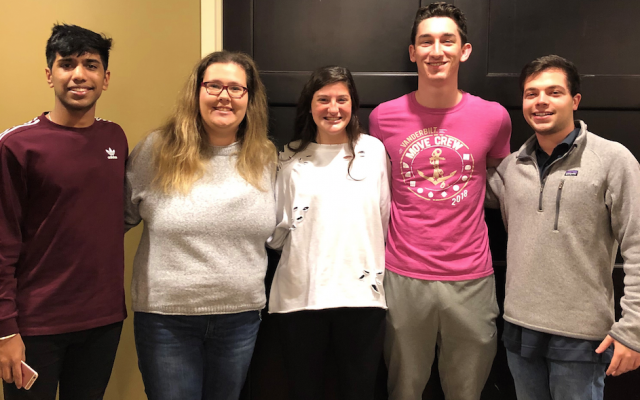Navigating the Road to College
As part of a new series of events to engage our community of high school students and recent grads, Gesher L’Torah held its first college panel Dec. 16.

Many synagogues struggle with retaining family members once their children graduate from high school. Engagement with high school and college students is equally difficult when synagogues have to compete with BBYO, Hillel, sports teams, part-time jobs and rigorous academic workloads.
As part of a new series of events to engage our community of high school students and recent grads, Gesher L’Torah held its first college panel Dec. 16. GLT college students making up the panel were: Alli Goldring, a freshman at the University of Georgia; Rachel Kaiser, a freshman at Middle Tennessee State University; Justin Rubin, a junior at UGA; and Harry Traub, a sophomore at Vanderbilt University. The panel was moderated by GLT marketing intern and Chattahoochee High School senior, Anurag Gillella.
The panel discussed topics such as the application process, the selection of schools, picking a major and the transition to college life, which can be overwhelming for many students. The biggest challenge the panel faced was learning to manage their time since college students are in class fewer hours per day than high school students. As such, “the need to hold yourself accountable,” as suggested by Justin, is critical. He pointed out that in large freshman classes, you typically don’t get homework on a regular basis. Grades are more heavily weighted on tests and exams. “I had to learn to study on my own even if I didn’t have homework or a quiz the next day.”
Other transitions include transportation and building a social network. Particularly on a large campus, learning the bus system is important. As Alli pointed out, your mom can’t drive you to school if you miss the bus. The panel agreed that making friends is not so difficult. “Everyone is looking to meet people,” Harry said. Alli suggested students join clubs as “they make big schools so much smaller.”
Questions from the audience led to the panel members discussing how they decided on their college. UGA is a popular choice given the strong balance of academic and social activities and the opportunity to qualify for the HOPE scholarship. Many high schoolers, however, worry that they “will know everyone” there. This was a big concern for Alli, who says this is really not the case and that her closest friends now are not from Georgia.
In terms of selecting a major, the panel advised that high schoolers pick something they actually want to do. A key suggestion by Rachel is to leverage the Academic Common Market, which identifies out-of-state schools offering in-state tuition if your desired degree is not offered in your state.
In terms of a high school curriculum, the panel advised the student audience to challenge themselves, but only in the courses they like or excel at. Only select an Advanced Placement course if you are confident you can do well, as performing poorly in these classes can hurt your Grade Point Average. “Definitely go for higher grades,” Harry suggested. The panel strongly believed that an A in a regular class is better than a C in an AP class.
The panel was also in favor of finding scholarships. They agreed that it takes time to find and apply for scholarships, but every $500 scholarship adds up and contributes to your financial package. Scholarships are offered by high schools as well as a variety of companies and organizations, including utilities such as electric and plumbing companies. If planning early enough, the panel recommended studying for the PSAT that is offered junior year, as National Merit Scholarships are awarded for high scores.
Attendees found the panel to be extremely insightful. “We learned a lot from some awesome GLT college students,” said GLT member Wendi Goldberg.



comments